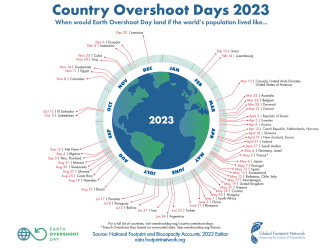Earth Overshoot Day for Ireland 2023

Today, April 21st, is Ireland's Earth Overshoot Day for 2023. This is the day when, if everybody lived as we do in Ireland, we will have used all the biological resources that regenerates during the entire year. The Global overshoot day for 2023 is due to be announced on June 5th. Last year's was July 28th. We now need 1.75 Earths in order to maintain this level of consumption. It is a powerful reminder of the negative impact that modern lifestyles and economic systems are having on the environment.
Past Earth Overshoot Days
The date on which we reach Earth Overshoot Day has shifted gradually each year from 25th December in 1971, to the 5th September in 2000 to now reaching the end of July in 2022. Earth Overshoot Day is based on the ecological footprint which is a measure of how much land and water area is needed to produce the resources that we consume and in turn then absorb the waste generated. The ecological footprint also takes into account factors such as food consumption, energy use, transportation, and waste disposal.
The ecological footprint has been growing steadily over the years, driven by population growth, economic development, and changes in lifestyle. As a result, Earth Overshoot Day has been getting earlier and earlier every year, indicating that we are using up the planet's resources at an unsustainable rate. We are depleting our natural resources, causing irreversible damage to ecosystems, and contributing to climate change. We are also putting a strain on the planet's ability to provide for us, which could lead to food and water shortages, mass migration, and social instability.
The choices we make as individuals and as societies is of vital importance if we are to tackle climate change. Climate change is a threat to human wellbeing and the health of the planet. Any further delay in concerted global action will miss a brief and rapidly closing window to secure a liveable future. Our climate action goals set for 2030 and 2050 can only be achieved with action now.

A Just Transition
To address the issue of Earth Overshoot Day, we need to take immediate and concrete action. This includes reducing our consumption of resources, adopting sustainable lifestyles, and implementing policies that promote conservation and preservation of the environment. We need to shift to renewable energy sources, promote circular economies that minimise waste, and support biodiversity conservation efforts. Governments, businesses, and individuals all have a role to play in addressing the issue of Earth Overshoot Day. Governments can implement policies that promote sustainable development, businesses can adopt sustainable practices and products, and individuals can reduce their ecological footprint by consuming less and recycling more.
One of the fundamental principles of a Just Transition is to leave no people, communities, economic sectors or regions behind as we transition to a low carbon future. Transition is not just about reducing emissions. This is just one part. It is also about transforming our society and our economy, and investing in effective and integrated social protection systems, education, training and lifelong learning, childcare, out of school care, health care, long term care and other quality services, Social investment must be a top priority of transition because it is this social investment that will support those people, communities, sectors and regions as we make the difficult transition to a carbon-neutral economy, transforming how our economy and society operates.
The coming decade will be one of transformation as we try to meet our climate goals. There are some specific policies that Social Justice Ireland has consistently advocated for, that would support us in meeting these targets in the years ahead. These are:
- Set ambitious emissions reduction targets for 2030 and ensure sufficient resources to support implementation of these targets;
- Adopt targets and a reporting system for each of the Sustainable Development Goals;
- Integrate a Sustainable Development Framework into economic policy;
- Introduce a strategy for Ireland that includes the principles of the circular economy and cradle-to-cradle development;
- Introduce shadow national accounts, and assign value to natural capital and ecosystems in our national accounting systems;
- Develop a comprehensive mitigation and transition programme to support communities and people in the transition to a low carbon society;
- Develop a progressive and equitable environmental taxation system;
- Develop a new National Index of Progress encompassing environmental and social indicators of progress as well as economic ones;
- Develop a Just Transition Dialogue structure at regional and national level.